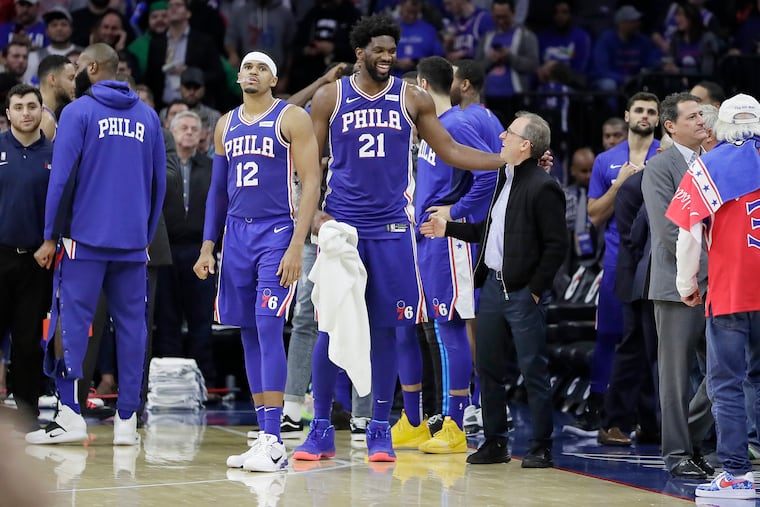If anyone needs to social distance, it’s the Sixers owners and their star players | Marcus Hayes
Trips to the beaches, Super Bowl luxury boxes, mediating player disputes, negotiating deals: Sixers owners need to stop commingling with their star players.

Two years ago, a late-night flight in a private jet whisked Joel Embiid and Ben Simmons from Philadelphia to South Beach to party with billionaires. Their hosts: A Sixers owner and a prominent owner of an NFL team, according to a person familiar with the excursion.
On Feb. 2, Embiid, Simmons, and Tobias Harris watched Super Bowl LIV with Sixers majority partner Josh Harris, and partners David Blitzer and Michael Rubin in Rubin’s private box at Hard Rock Stadium, where Sixers superfan Kevin Hart joined them. The team lost big against Miami the next night.
When Jimmy Butler first joined the Sixers in the fall of 2018, before he and Embiid became good friends, he clashed with Embiid to such a degree that Embiid considered requesting a trade. Before that happened, one of the Sixers' owners played peacemaker between the two Alpha dogs, according to a longtime Sixers investor.
When the $100 million contracts of Embiid, Simmons, Harris, and Al Horford were negotiated, either Josh Harris or his proxy, former minority partner David Heller, was involved in the process up to his elbows, according to league sources — as in, the elbows were on the negotiating table. That’s easy to believe, considering Harris is the micromanaging cofounder of the $433 billion private-equity firm Apollo Global Management, Inc.
» READ MORE: In his first day on the job, Daryl Morey showed why the Sixers hired him | David Murphy
Little wonder, then, Butler felt comfortable intruding into coach Brett Brown’s strategy meetings at the team’s practice facility and often reacted to Brown’s on-court instructions with visible disdain. Little wonder, then, when Brown told Simmons to shoot three-pointers, Simmons simply ignored him. Little wonder that Embiid hasn’t been in NBA shape for a single minute of his six-year career.
Why should players listen to their coaches or trainers? They knew the owners had their backs and their insubordination had no consequences.
This is what Daryl Morey and Doc Rivers have walked into.
Morey might be the Stephen Hawking of basketball analytics, and Rivers might join Lenny Wilkens and Jerry Sloan in the Hall of Fame one day, but, for all their ability, neither Morey nor Rivers will succeed if the owners don’t distance themselves from the players.
When asked if he and his partners were willing to do this, Harris bristled.
“I wouldn’t agree with the premise,” Harris said Monday at Morey’s introductory press conference.
The premise — that Sixers ownership created a culture in which players were not accountable to coaches or management — was first raised on these pages nine months ago and was supported by some of the evidence mentioned above. After that story was published, more sources came forward with more instances of owner-player interaction that crossed the line of normalcy. All of the stories came from people with direct knowledge of the various incidents. Neither Brown nor general manager Elton Brand supplied the evidence. Brown declined to comment for this story.
It doesn’t matter whether Harris agrees with the premise or not. Harris doesn’t have to agree with it for it to be uncomfortably true. This sort of familiarity can have disastrous effects.
Embiid’s poor conditioning has led to him fading in the playoffs and has contributed to his unavailability. Simmons’ refusal to shoot even mid-range shots is such a liability that teams actually dare him to shoot from the perimeter. He has taken 25 three-pointers in his career. Shaquille O’Neal took 22.
Butler, unable to coexist with Brown, was shuttled off to Miami after 2018-19, where this season he led the Heat to the NBA Finals. Brown’s Sixers watched from home; they’d been swept at the hands of the Celtics in the first round, and Brown was fired.
It wasn’t only Brown and the other coaches who suffered from the players' lack of accountability.
During his brief tenure as general manager, Bryan Colangelo indicated that ownership hamstrung him as he tried to deal with Markelle Fultz’s mysterious shoulder injury after the Sixers selected Fultz with the No. 1 pick in 2017. Brown and Brand (who remains as GM) constantly had to deal with Embiid’s notorious moodiness as well as Simmons' close-knit, intrusive family: Simmons' father often offered Brown unsolicited input, and Ben once hired his own brother, Liam, to act as his personal shooting coach, usually at whatever facility the Sixers used to practice that day, sometimes on the road.
» READ MORE: Daryl Morey is ready to work with a Sixers roster that has championship aspirations
It should be noted that Sixers ownership largely is a group of decent men with progressive ideas and a dynamic shared mindset. They consider themselves nurturers, protectors, and sponsors of promising young men.
But the bottom line was this: They’re middle-aged dudes dressing funky and trying to look cool. And what better means to look cool than by hanging out at the biggest sporting event of the year with a movie star and a giant guy who named himself “The Process,” claims 6.1 million followers on social media, and has a national advertising campaign with Hulu?
It can be intoxicating to share the company of luminaries, but the line between employee and employer should never become too blurred.
Will Sixers owners quit partying with their players? Harris, despite his protests that the premise is flawed, indicated that they will.
“Daryl’s going to run the overall basketball operations. Doc’s going to run the team. Ownership is going to do what it needs to do to stay out of the way and support Doc, and Daryl, and Elton, in terms of their jobs.
“We’re taking our cue from Daryl, and then Doc, and Elton, as to how we interact with players.”
Here’s a cue:
Get lost.